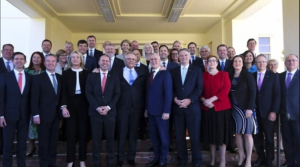How the new federal ministry shapes up
 In the wake of the Coalition’s federal election victory last month, some aspects of the leadership structure of the community and humanitarian sectors have changed while much has stayed the same.
In the wake of the Coalition’s federal election victory last month, some aspects of the leadership structure of the community and humanitarian sectors have changed while much has stayed the same.
Peter Dutton remains as Minister for Home Affairs. Mr Dutton’s tenure over Home Affairs has made him one of the most recognisable and controversial figures in Australian politics.
Mr Dutton will be opposed by former NSW Premier Senator Kristina Keneally as shadow minister.
David Coleman remains as Minister for Immigration, Citizenship, Migrant Services and Multicultural Affairs.
Mr Coleman was assigned to his first Ministerial position in this portfolio post-leadership spill in 2018. The portfolio has now been expanded to include Migrant Services and Minister Coleman will manage both the Humanitarian Settlement Program (HSM) and Adult Migrant English Program (AMEP).
Senator Marise Payne has become Minister for Women. She previously served as the Minister for Human Services as well as for Defence, but now also takes on the role of Minister for Foreign Affairs since Julie Bishop’s exit from politics last year.
Victorian Dan Tehan keeps his Education portfolio after being assigned the position once Scott Morrison became Prime Minister last year.
Fellow Victorian Alan Tudge has become Minister for Population, Cities and Urban Infrastructure and will renew the Morrison government’s pre-election plan to promote more migration into regional Australia.
That plan included the creation of two new regional visas requiring skilled workers to live outside major cities for three years before they can apply for permanent residency.
Senator Michaelia Cash returns as Minister for Employment, Skills, Small and Family Business and will oversee the Jobactive program.
Serving under Cash as the Assistant Minister for Vocational Education, Training and Apprenticeships is Steve Irons.
Mr Irons, who has held the marginal seat of Swan since 2007 and is a former ward of the state, has been most notable in agitating for better accountability in the area of child welfare.
Anne Ruston has become Minister for Families and Social Services.
Ms Ruston previously held positions as an assistant minister, firstly for agriculture and water resources under Malcolm Turnbull, then for international development and the Pacific after Morrison took power.
Answering to Ms Ruston as the Assistant Minister for Children and Families is Central Queensland MP Michelle Landry, who was appointed to the role by Morrison last year.
Immigration Minister David Coleman, in a statement issued upon his swearing in, said it would be business as usual for Australia’s immigration programs.
“Our Government will continue to run an orderly, non-discriminatory immigration program that is focused squarely on our national interests. We will maintain a strong emphasis on the economic benefits of migration, filling gaps in skilled employment to help grow the economy,” he said.
“We will continue to run a significant humanitarian program, and ensure that it is always managed in Australia’s national interest. We will manage our temporary migration programs to maximise their job-creating benefits for Australians,” Minister Coleman said.
“The key outcome we will be focused on in Migrant Services is employment. In integrating into Australian life, there is nothing more important than getting a job.
“Our multicultural society is one of our greatest strengths as a nation,” he said.
Tom Danks












